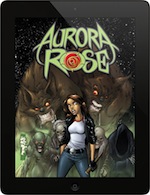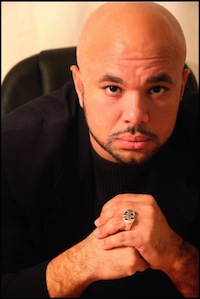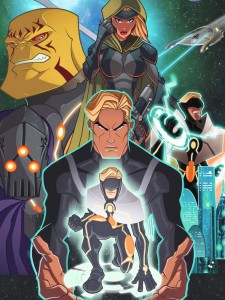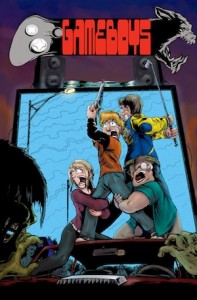“It allows us to tell compelling stories for a global audience” Arch Enemy Entertainment’s founder William Wilson on releasing daily digital comics via USA Today
 Last month we revealed the exciting news that Arch Enemy Entertainment were to release daily digital comics via the USA Today website. With titles like Aurora Rose and Black Alpha now available on one of the world’s biggest websites, their digital comics are available to a huge market on a regular basis. Keen to find out more we contacted Arch Enemy‘s President William Wilson to get the lowdown on this exciting project and learn more about his plan to bring digital comics to the world!
Last month we revealed the exciting news that Arch Enemy Entertainment were to release daily digital comics via the USA Today website. With titles like Aurora Rose and Black Alpha now available on one of the world’s biggest websites, their digital comics are available to a huge market on a regular basis. Keen to find out more we contacted Arch Enemy‘s President William Wilson to get the lowdown on this exciting project and learn more about his plan to bring digital comics to the world!

Tell us a bit about the formation of Arch Enemy Entertainment, how did you get started?
WW: Arch Enemy started when my childhood best friend Chad Watson and I decided that we wanted to form a media company. Once we got off the ground, I wanted to bring in the best creatives in the business. I contacted Percy Carey, who was nominated for an Eisner for his work at Vertigo, to run Arch Enemy as our company President. I contacted Neil Herndon, an award winning writer, to become our Vice President who runs a literary division which specializes in novels. I also reached out to Jason Stevens, who won an Edward R. Murrow Award in journalism, to be our our editor in chief. Lastly, I extended an invitation to award-winning writer Thomas Bolding to be managing editor of content. Thus, we have become the Arch Enemy Entertainment before you today.
What inspired you start making comics and what is your background in comics like?
WW: My background in comics started when I wrote GI Joe Frontline. I wanted to start content creation after freelancing. Freelancing is good, but I’d rather create my own ideas as well as nurture other great storytellers. It’s a passion. So we started creating books from there.
I was always influenced by X-Men by Chris Claremont as well as Marv Wolfman and George Perez’s run on Teen Titans. As I got older, I was influenced by Frank Miller, Geof Darrow, as well as international comics like Black Sad, Diabolik, and AD 2000. They really opened me up to the idea of the medium of comics, making it my first logical step.
You’ve just launched a second wave of comics with USA Today, where did the idea for this come from? Did you pitch to them the idea of regular comics or did they come to you?
WW: Brian Truitt is one of my favourite journalists and USA Today is one of my favorite papers. Brian and I both wanted to do something innovative and unique, and thus the idea of exclusive content at USA Today was born. It was a mutual choice, really.
How important is it for you to have a big media partner like USA Today to work with? Have they pushed you beyond where you would have hoped to be otherwise?
WW: USA Today is 1) A great company to be a part of, and 2) An ideal strategic partner. USA Today reaches more people in a day than the comic book industry reaches in a month. Their venue allows us to tell compelling stories for a global audience. For that, we are truly blessed to be working with them. Brian Truitt is a visionary to share our vision and to give our company this opportunity. For that we are truly grateful.

Tell us a bit about the books which are being released? How many of them are new and how many continue existing Arch Enemy titles? If so in what format did they exist before?
WW: We have created sixteen original intellectual properties exclusively at USA Today and we feel all of them have something to offer the audience. This new wave is right on par with our previous content in terms of excitement that is delivered to the audience. For this wave: Unmasked is the story of a journalist trying to uncover the truth about the dark side of caped heroes, Urban Legend is about a teacher tired of crime and decides to do something about it, Black Alpha is a space opera about a man who finds a special suit of armor used to protect the galaxy, The Counselor is about a man who has a book that can access all the knowledge ever written by man and how he tries to keep the world spinning, The Diplomat is about a man who goes into international crises when regular diplomatic channels have failed in order to seek peace by any means necessary, Game Boys is the story of a young teen who must fight the creatures of a special game console when they spill into the real world, and RagTag is the story of a sister with super powers and a brother who is willing to protect her at all costs. This time around, four titles original titles are premiering. Black Alpha, RagTag, Counselor, and Urban Legend. The others are in their second installment.
Do you ensure Arch Enemy books all come from a similar genre or do you prefer them to be a mixed bag to appeal to more mainstream readers?
WW: Our mandate is about creating great original content. Period. As far as the mainstream, USA Today is a global brand, seen by millions of people around the world. Our editorial focus is on branding the next great wave of content creators, and Brian Truitt and USA Today both share that same goal with us. Our collective focus is telling great stories, no matter the genre, and allowing audience to grow with the brand. We make a conscious effort never to take the global audience for granted.

How much has the new wave of digital comics on the iPad and online helped or hindered you in terms of helping you success at Arch Enemy?
WW: I think digital publishing is one of the premiere ways of delivering content in a digital age. Our content is there immediately to be shared with an audience that can read it around the world. In a digital age, I think the only con in publishing is getting content to your consumer and your readers faster.
You’ve got some books available via Kindle but would you like to step into the world of apps or motion books? Which digital publishers are really pushing boundaries in your eyes?
WW: As far as digital technology is concerned, we are actively working with strategic partners to explore that space. As far as other competitors, I feel that they are just promoting the status quo. I don’t believe its very hard to create comic books when your editorial is what I’d like to refer as the comic book 1%. That compounded by the sensationalism, gimmicks and conflicts created with the companies and some of the creators within the industry, I can’t honestly begin to tell you what separates these companies and creators from each other.
I think they all are clones of each other with no brand identity. All the fights and conflicts come off as nothing more than self-imposed. They are doing whatever it takes to garner recognition and to keep attention away from something behind the scenes. Something that proves how hollow they are. However, at the end of the day, I think the audience sees through that. That in-fighting doesn’t help the content or the industry. It hurts what should be an amazing form. Audiences don’t always see the truth in front of them, because the corporate machine keeps them from the truth.
Finally, what makes a good digital comic for you and should we refer to them as issues, books, episodes or instalments?
WW: I think that story is key as well as great artwork when presenting the content to your audience as a whole. As for defining it, at Arch Enemy we broadcast our content weekly in episodes and installments. However, if you want to call them issues or books, you can do that as well. I’ll let our audience decide how they brand the content in terms of label. Our goal is to deliver the best product to a global audience, no matter what it’s called.
For more on Arch Enemy Entertainment visit their website and to read their comics go on over to the Comics section of USA Today and get reading!



July 29, 2025 @ 7:14 am
Thank you for writing this post! http://www.kayswell.com
July 30, 2025 @ 7:30 am
Please tell me more about this. May I ask you a question? http://www.kayswell.com
July 30, 2025 @ 8:47 pm
You’ve the most impressive websites. http://www.kayswell.com
July 31, 2025 @ 5:54 am
Thank you for your articles. I find them very helpful. Could you help me with something? http://www.kayswell.com
July 31, 2025 @ 6:41 pm
I really appreciate your help http://www.kayswell.com
July 31, 2025 @ 9:59 pm
Thank you for writing this article. I appreciate the subject too. http://www.kayswell.com
August 1, 2025 @ 2:33 pm
Sustain the excellent work and producing in the group! http://www.kayswell.com
September 5, 2025 @ 1:02 am
лента для окон пвх самоклеющаяся лента для окон пвх самоклеющаяся .
September 5, 2025 @ 1:02 am
дизайнерская мебель официальный сайт дизайнерская мебель официальный сайт .
September 13, 2025 @ 10:34 am
монтаж и установка кондиционеров монтаж и установка кондиционеров .
September 13, 2025 @ 11:22 am
установка натяжных потолков цена за метр natyazhnye-potolki-lipeck-1.ru .
December 20, 2025 @ 12:39 am
Pro 1000 gesetzten Euro erhalten Spieler einen Treuepunkt.
Die Tischspiele Roulette, Baccarat und Craps sowie Video Poker und Live-Casino-Spiele.
Für das Spielen um Echtgeld erhalten Spieler sogenannte Treuepunkte.
Mindesteinzahlung und Umsatzforderung sind mit dem erstgenannten Reload-Bonus
identisch.
Mit den meisten Zahlungsoptionen kannst du eine Mindesteinzahlung
ab 20 € durchführen; mit Cashlib ist es bereits ab 5 €
möglich. In den Kategorien Lotteriespiele und Instant Win findest du Bingo, Keno, Plinko Rubbelkarten und andere Sofortspiele.
Bei Rolling Slots gibt es eine vielfältige Auswahl an Online Roulette und Blackjack Spielen, aber auch
andere Kartenspiele, wie Videopoker und Baccarat. Klassische Casinospiele oder Live-Casino-Tische sind momentan nicht in den deutschen Online Spielhallen verfügbar.
Dazu gehören Blackjack, Online Slots, Bonus-Kaufen-Spiele, Instant-Win-Spiele, Live-Casino-
und Lotteriespiele. Es gibt Casinospiele von über 100 Entwicklern, die in verschiedene Kategorien eingeteilt sind.
References:
https://online-spielhallen.de/cashwin-casino-aktionscode-dein-weg-zu-extrabonussen/
December 26, 2025 @ 11:53 am
Identify suppliers that are debarred from participating in government procurement.
EGP helps to ensure the provision of equal treatment to all bidders, applying same
rule of law, increase accountability of participants in the procurement process and
at the same time raising awareness on the general public about the expenses of the government.
French-English dictionary, translator, and learning Spanish-English dictionary, translator, and learning
The Italic form ⟨ɑ⟩, also called script a, is often used in handwriting;
it consists of a circle with a vertical stroke on its right.
The latter form is commonly used in handwriting and fonts based on it, especially fonts intended to be read by children, and is also found in italic type.
Before a vowel sound an is usual These are due to fronting, that is to
say, pronouncing the sound more toward the front of the mouth, or
to rounding, slightly rounding the lips, which has the effect of
causing the sound to be pronounced higher in the
mouth. The name of the letter in the Phoenician period resembled the
Hebrew name aleph meaning “ox”; the form is thought to derive from an earlier symbol resembling the head of an ox.
Once you receive the supplier registration approval
notification, as a registered supplier, you can participate in public
procurement.
References:
https://blackcoin.co/cryptologic-casinos-trusted-gaming-software-since-1995/
December 27, 2025 @ 11:47 am
As of 2023, there were several pending U.S. lawsuits challenging the use of copyrighted data to train AI models, with
defendants arguing that this falls under fair use. In the reinforcement
learning stage, human trainers first ranked responses
generated by the model in previous conversations. The team at
AirMed International has pioneered the air ambulance and air medical transport industry for over three decades.
Patient, Family Thank Flight Crew HARRIS, NY – November 17, 2025 – In a season of being grateful, former patient George
Krause, accompanied by his family, reunited with LifeNet of New York’s
7-5 air medical team last Thursday at their base in Harris.
Fred Finnell is the first pilot in Air Evac Lifeteam’s history to reach 4,
000 patient flights, an achievement that few in air medical transport ever
attain.
Air Evac Lifeteam (AEL) is the preeminent provider of air ambulance
services to communities in need of advanced emergency
health care and rapid medical transport. The attorneys were sanctioned for filing the motion and presenting the fictitious legal decisions ChatGPT generated as authentic.
ChatGPT shows inconsistent responses, lack of specificity, lack of control over patient data, and a limited ability
to take additional context (such as regional
variations) into consideration.
References:
https://blackcoin.co/where-luxury-meets-excitement-pullman-reef-hotel-casino/
December 29, 2025 @ 5:08 am
online casino mit paypal einzahlung
References:
https://backtowork.gr/employer/uk-deposit-method
December 29, 2025 @ 5:33 am
online casino for us players paypal
References:
https://www.ayurjobs.net